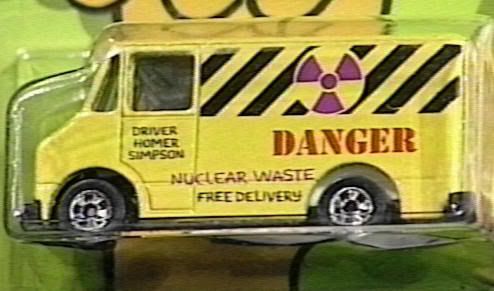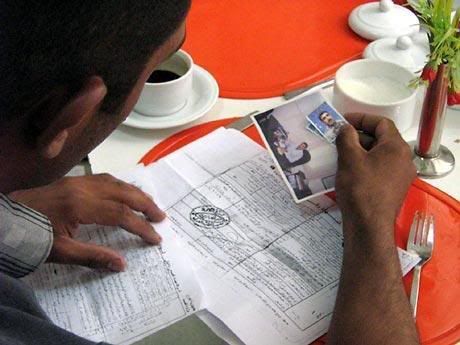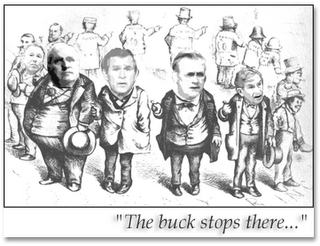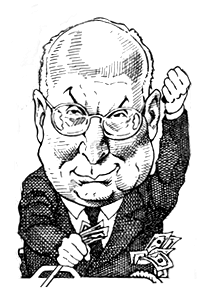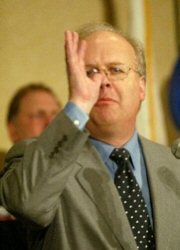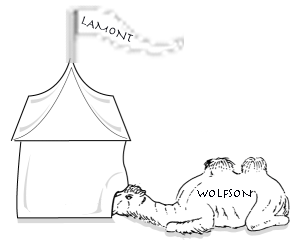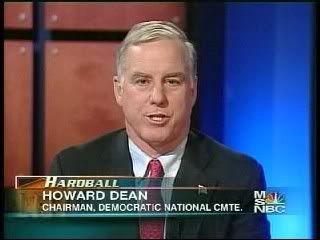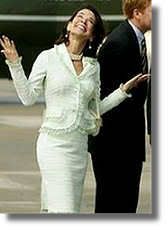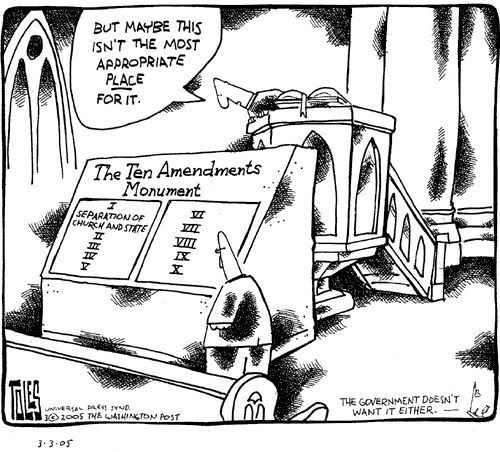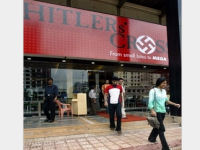1870: Maria Montessori was born. * * * * * * *
1888: Jack the Ripper claims first victimProstitute Mary Ann Nichols, the first victim of London serial killer "Jack the Ripper," is found murdered and mutilated in Whitechapel's Buck's Row. The East End of London saw four more victims of the murderer during the next few months, but no suspect was ever found.
In Victorian England, London's East End was a teeming slum occupied by nearly a million of the city's poorest citizens. Many women were forced to resort to prostitution, and in 1888 there were estimated to be more than 1,000 prostitutes in Whitechapel. That summer, a serial killer began targeting these downtrodden women. On September 8, the killer claimed his second victim, Annie Chapman, and on September 30 two more prostitutes--Liz Stride and Kate Eddowes--were murdered and carved up on the same night. By then, London's police had determined the pattern of the killings. The murderer, offering to pay for sex, would lure his victims onto a secluded street or square and then slice their throats. As the women rapidly bled to death, he would then brutally mutilate them with the same six-inch knife.
The police, who lacked modern forensic techniques such as fingerprinting and blood typing, were at a complete loss for suspects. Dozens of letters allegedly written by the murderer were sent to the police, and the vast majority of these were immediately deemed fraudulent. However, two letters--written by the same individual--alluded to crime facts known only to the police and the killer. These letters, signed "Jack the Ripper," gave rise to the serial killer's popular nickname.
On November 7, after a month of silence, Jack took his fifth and last victim, Irish-born Mary Kelly, an occasional prostitute. Of all his victims' corpses, Kelly's was the most hideously mutilated. In 1892, with no leads found and no more murders recorded, the Jack the Ripper file was closed.
* * * * * * *
1903: Arthur Godfrey was born. * * * * * * *
1908: William Saroyan was born. * * * * * * *
1918: Alan Jay Lerner was born. * * * * * * *
1924: Buddy Hackett was born. * * * * * * *
1928: James Coburn was born. * * * * * * *
1935: Eldridge Cleaver was born. * * * * * * *
1939: Germany prepares for invasion of PolandAt noon, despite threats of British and French intervention, Nazi leader Adolf Hitler signs an order to attack Poland, and German forces move to the frontier. That evening, Nazi S.S. troops wearing Polish uniforms staged a phony invasion of Germany, damaging several minor installations on the German side of the border. They also left behind a handful of dead German prisoners in Polish uniforms to serve as further evidence of the alleged Polish attack, which Nazi propagandists publicized as an unforgivable act of aggression.
At dawn the next morning, 58 German army divisions invaded Poland all across the 1,750-mile frontier. Hitler expected appeasement from Britain and France--the same nations that had given Czechoslovakia away to German conquest in 1938 with their signing of the Munich Pact. However, neither country would allow Hitler's new violation of Europe's borders, and Germany was presented with an ultimatum: Withdraw by September 3 or face war with the Western democracies.
At 11:15 a.m. on September 3, a few minutes after the expiration of the British ultimatum, Prime Minister Neville Chamberlain appeared on national radio to announce solemnly that Britain was at war with Germany. Australia, New Zealand, and India immediately followed suit. Later that afternoon, the French ultimatum expired, and at 5:00 p.m. France declared war on Germany. The European phase of World War II began.
* * * * * * *
1945: Itzhak Perlman was born. * * * * * * *
1949: Richard Gere was born. * * * * * * *
1951: William O. Douglas calls for recognition of PRCFollowing a hiking and mountain climbing trip through Asia, Supreme Court Justice William O. Douglas issues a statement calling for the recognition of the communist People's Republic of China. His comments touched off an angry partisan debate in the U.S. Senate.
Douglas spent much of the summer of 1951 hiking and mountain climbing around the borders of Russia and China. Upon his return, Douglas urged that the United States recognize communist China. America had not established diplomatic relations with the communist People's Republic of China since the establishment of that nation in 1949, following Mao Zedong's successful revolution. And by 1951, U.S. troops were battling Chinese military forces in the Korean War. Nevertheless, Douglas suggested that U.S. diplomatic recognition of China would be a "real political victory" for the West.
Recognition by America, he reasoned, would help split China from its dependence on the Soviet Union and perhaps stem the tide of communist expansion in the Far East. "Recognition," Douglas stated, "will require straightforward and courageous thinking by all Americans, but it is the only logical course." In the U.S. Senate, Herman Welker (R-Idaho) set off a furious exchange when he proposed that Douglas's comments be printed in the Congressional Record. He suggested that the justice was a "high Administration spokesman" and that his statement indicated that the Democratic administration of President Harry S. Truman was considering recognition of China. Tom Connally (D-Texas) rose to attack Welker's action as pure politics and a "purely personal attack" on President Truman. Connally then chided Douglas for his "fool statements." Douglas, he suggested, was not the secretary of state or president and should "stay home instead of roaming all around the world and Asia." Senator Everett M. Dirksen (R-Illinois) commented that Douglas's comments could not be "divorced from the party in power."
The firestorm set off by Douglas's comments showed that despite talk about a "bipartisan" Cold War foreign policy, party loyalties were a very important component of post-World War II debates on America's diplomacy. In 1951, Republicans were still blaming Democrat Harry S. Truman for having "lost" China to the communists in 1949. The Democrats had their turn, however, during the presidential campaign of 1960, when John F. Kennedy jabbed at the Republican administration of President Dwight D. Eisenhower for "losing" Cuba.
* * * * * * *
1955: Cobb demonstrates first solar-powered carThe world's first solar-powered automobile, designed by William G. Cobb, was demonstrated at the General Motors Powerama in Chicago. Today, solar car competitions are held all over the world, pitting design teams against each other in grueling races. However, a mass-produced solar car has yet to hit the market.
* * * * * * *
1955: Dulles supports Diem's decision not to hold national electionSecretary of State John Foster Dulles supports South Vietnamese President Ngo Dinh Diem's position regarding his refusal to hold "national and general elections" to reunify the two Vietnam states. Although these elections were called for by the Geneva Accords of July 1954, Diem and his supporters in the United States realized that if the elections were held, Ho Chi Minh and the more populous north would probably win, thereby reuniting Vietnam under the Communist banner. Accordingly, he refused to hold the elections and the separation of North and South soon became permanent.
* * * * * * *
1957: Kukla, Fran and Ollie's final episodeOn this day in 1957, children's show Kukla, Fran and Ollie airs its last episode on prime-time network TV. The show featured beloved puppets Kukla, Ollie (a dragon), and others, with live actress Fran Allison as host. The show began as a local Chicago program and moved to NBC in 1948. It was one of the two most important series made in Chicago, along with Garroway at Large, during the city's brief period as an important production center for network programs in the late 1940s. After its network cancellation, PBS revived the series from 1969 to 1971.
* * * * * * *
1965: Ky refuses to negotiate with the CommunistsPremier Nguyen Cao Ky announces that South Vietnam would not negotiate with the Communists without guarantees that North Vietnamese troops would be withdrawn from the South. He also said that his government would institute major reforms to correct economic and social injustices. Also on this day: In the United States, President Johnson signs into law a bill making it illegal to destroy or mutilate a U.S. draft card, with penalties of up to five years and a $10,000 fine.
* * * * * * *
1967: Senate Committee calls for stepped-up bombing Senate Preparedness Investigating Committee issues a call to step up bombing against the North, declaring that McNamara had "shackled" the air war against Hanoi, and calling for "closure, neutralization, or isolation of Haiphong." President Johnson, attempting to placate Congressional "hawks" and the Joint Chiefs of Staff, expanded the approved list of targets in the north, authorizing strikes against bridges, barracks, and railyards in the Hanoi-Haipong area and additional targets in the previously restricted areas along the Chinese border.
* * * * * * *
1970: Thieu government maintains control of SenateIn South Vietnam, antigovernment Buddhist candidates appear to win 10 of 30 Senate seats contested in the previous day's election. However, the Senate as a whole remained in the firm control of conservative, pro-government supporters. Catholics still held 50 percent of the Senate seats, even though they constituted only 10 percent of the population of South Vietnam.
* * * * * * *
1970: Debbie Gibson was born. * * * * * * *
1972: U.S. weekly casualty figures hit new lowU.S. weekly casualty figures of five dead and three wounded are the lowest recorded since record keeping began in January 1965. These numbers reflected the fact that there were less than 40,000 American troops left in South Vietnam by this time and very few of these were involved in actual combat. U.S. troop withdrawals had begun in the fall of 1969 following President Richard Nixon's announcement at the Midway conference on June 8, 1972, that he would begin reducing the number of American troops in Vietnam as the war was turned over to the South Vietnamese as part of his "Vietnamization" policy. Once the troop withdrawals began, they continued on a fairly regular basis, steadily reducing the troop level from the 1969 high of 543,400.
* * * * * * *
1985: The "Night Stalker" is attacked by a Los Angeles mobRichard Ramirez, the notorious "Night Stalker," is captured and nearly killed by a mob in East Los Angeles, California, after being recognized from a photograph shown both on television and in newspapers. Recently identified as the serial killer through a partial fingerprint, Ramirez was pulled from the enraged mob by police officers.
During the summer of 1985, the city of Los Angeles was panic-stricken by a killer who crept into his victims' homes at night. The Night Stalker, as the press dubbed the murderer, first turned his attention on the men in the house, usually shot any men in the house with a .22 caliber handgun before raping, stabbing, and mutilating his female victims. He cut out one of his victim's eyes, and sometimes carved satanic pentagrams on the bodies before he left.
By August, the Night Stalker has murdered at least a dozen people, and law enforcement officials were desperate to stop him. One witness, who managed to note the license plate of the car in which Ramirez fled, led police to a single, partial fingerprint left in the vehicle.
Apparently, the task force looking for the Night Stalker had already received information that someone named Ramirez was involved, so only the records for men with that name were checked against the fingerprint. Although the Los Angeles Police Department's new multimillion-dollar computer database of fingerprints only contained the records of criminals born after January 1960, Richard Ramirez, who had a record of petty crimes, had been born in February 1960.
When Ramirez was identified as the chief suspect, authorities debated whether to release his name and picture to the public, fearing that it might give him the chance to escape. Nonetheless, they decided to take the risk, and Ramirez, who was actually traveling back to Los Angeles at the time, arrived to find his face and name on the front of every newspaper.
Ramirez turned his trial into a circus by drawing pentagrams on his palms and making devil's horns with his fingers. When he was convicted, he shouted at the jury, "You make me sick. I will be avenged. Lucifer dwells within all of us." After the judge imposed a death sentence, Ramirez said, "Big deal. Death comes with the territory. See you in Disneyland."
Ramirez married a female admirer and penpal while incarcerated at California's St. Quentin Prison in 1996. In 2006, his first appeals were denied.
* * * * * * *
1997: PRINCESS DIANA DIES:Diana, Princess of Wales, dies in Paris' Pitie-Salpetiere Hospital after suffering massive chest injuries in an early morning car accident. Her companion, Dodi Fayed, was killed instantly in the 12:25 a.m. crash, as was driver Henri Paul, who was drunk and lost control of the Mercedes in a highway underpass. He was driving at excessive speeds in a reckless attempt to escape paparazzi photographers. Diana's bodyguard, Trevor Rees Jones, escaped with serious but nonfatal injuries. He was the only one wearing his seat belt. The death of Diana, beloved by millions for her beauty and good nature, plunged the world into mourning.
* * * * * * *
2006: Iran ignores a U.S.-pressured UN Security Council demand to stop enriching uranium. * * * * * * *
2006: Captured polygamist on the FBI's top ten list, Warren Jeffs, doesn't fight extradition to Utah. * * * * * * *
2006: Norway police recover Munch paintings ("The Scream") stolen in 2004. * * * * * * *
2006: Ford Considers Selling Aston Martin Unit. * * * * * * *
2006: Jetliner Evacuated Safely After Fire in Wheel Well. * * * * * * *
2006: Man Jailed for Enslaving Housekeeper. * * * * * * *
2006: Katrina Evacuees' Welcome Wears Thin in Houston. * * * * * * *
2006: FBI Searches Offices of 7 Alaska lawmakers, Declining to Name the Other Agencies Involved, Which Legislators and How Many Total Were Targeted or What the Intend of the Search Was. * * * * * * *
2006: Rich, Vacuous Shiksa (No, Not Paris Hilton), Gets Richer. * * * * * * *
2006: Richer, Defense Contracting Firm Gets Richer, With Multi-Billion Dollar Contract to Build Moon Rocket. * * * * * * *
August 31, 2006: American media, stalling for Karl Rove's next stunt, reported on everything, but what was relevant to the American people about what was at stake in their decision in the coming midterm elections.Courtesy of www.history.com, www.cnn.com, and www.msnbc.msn.comFiled under: This Day in History


